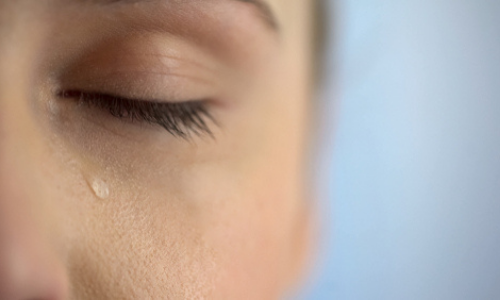
How Your Tears Protect and Enhance Your Vision
Tears not only help you express emotions but also keep your eyes healthy. The constant moisture provided by tears is essential for eye comfort and clear vision.
What Do Tears Do?
Tears are produced by the lacrimal gland, a small gland located above each eyelid. Every time you blink, a film of tears coats your eyes. Some tears evaporate while others eventually exit through tiny drainage channels in the inside corners of your eyes that are connected to your nose.
Tears have several functions. They're needed to:
- Moisturize the Eyes. Every time you blink, a layer of tears covers your eyes, keeping them moist and comfortable. These tears, called basal tears, also have an anti-bacterial effect and can help you avoid eye infections.
- Remove Debris. Reflex tears wash away dust and debris that can fall into your eyes. When your eyes sense the presence of a foreign body, tear production ramps up in an attempt to flush out the object. Reflex tears also appear in your eyes when you cough or yawn.
- Provide Clear Vision. Washing away dust and debris removes obstructions that could cloud your vision or scratch your eye. They also play a role in light focusing, an essential component of clear vision.
- Help You Show Emotion. Tears start to flow whether you're happy, sad, or in pain. Crying sheds hormones that make you feel stressed, while also triggering the production of endorphins, hormones that improve your mood.
The Three Layers of Tears
The watery liquid produced by the lacrimal glands mixes with oils and mucus to create three-layered tears. Every tear you produce contains these layers:
- Mucin. Located closest to your eye, the inner mucin layer of the tear contains mucus, which helps tears adhere to the surface of the eyes.
- Aqueous. The middle aqueous layer contains much of the water in a tear.
- Lipid. The outer lipid layer is made up of oils that prevent tears from evaporating too soon. Oils also keep the surface of the tears smooth and transparent, which is essential for good vision.
How Lack of Tears Can Affect Your Vision
Lack of moisture causes a condition called dry eye. You may develop dry eye if you don't produce enough tears or your tears drain or evaporate too quickly.
Symptoms of dry eye include:
- Blurred Vision
- Double Vision
- Sensitivity to Light
- Itching
- Burning
- Aching
- Redness
- Foreign Body Sensation
If dry eye is severe, temporary or permanent damage to your cornea can occur. The cornea is the layer of tissue covering your iris and pupil. If the cornea becomes scarred, you'll have trouble seeing clearly.
Factors that can cause or worsen dry eye include:
- Using Digital Devices. People tend to blink less when using smartphones, laptops, and other digital devices.
- The Weather. Your eyes may feel drier on windy, dusty, or sunny days.
- Your Age. Dry eye is more common in people over 50, according to All About Vision.
- Low Indoor Humidity. Any system or device that decreases humidity, whether it's a furnace, fan, or air-conditioner, can dry your eyes.
- Diseases. People who have Sjogren's syndrome, diabetes, lupus, thyroid disease, rheumatoid arthritis, and other diseases may be more likely to develop dry eye.
- Other Factors. Your risk of dry eye may increase if you wear contact lens, fly often, take certain medications, are a post-menopausal woman, or don't close your eyes completely while you sleep.
Preventing and Treating Dry Eye
Blinking more often, taking frequent breaks while using digital devices, and wearing wraparound sunglasses can help you keep your eyes moist. Using a humidifier, particularly while you sleep, may also reduce dry eye.
Replacing lost moisture is a simple way to ease dry eye symptoms. Drugstore shelves are full of over-the-counter eye drops and artificial tears that increase moisture and reduce blurred vision, discomfort, and double vision.
If your eyes don't feel better after using over-the-counter drops, you may benefit from prescription eye drops that boost tear production. Treatments that unclog blocked oil glands might be helpful if your tears evaporate too quickly due to insufficient oil content. Punctal plugs offer another option for severe dry eye. Temporary or permanent plugs are added to drainage channels in your eyes and prevent tears from draining.
Have you been struggling with dry eye? We can help ease your discomfort and keep your vision clear. Contact our office to schedule your appointment.
Sources:
National Eye Institute: How Tears Work, 7/16/19
American Academy of Ophthalmology: Facts About Tears, 12/21/16
All About Vision: Dry eye syndrome: Symptoms and causes, 6/19
Duke Health: Immune Response Likely Culprit in Eyelid Gland Condition That Causes Dry Eye, 7/25/18
